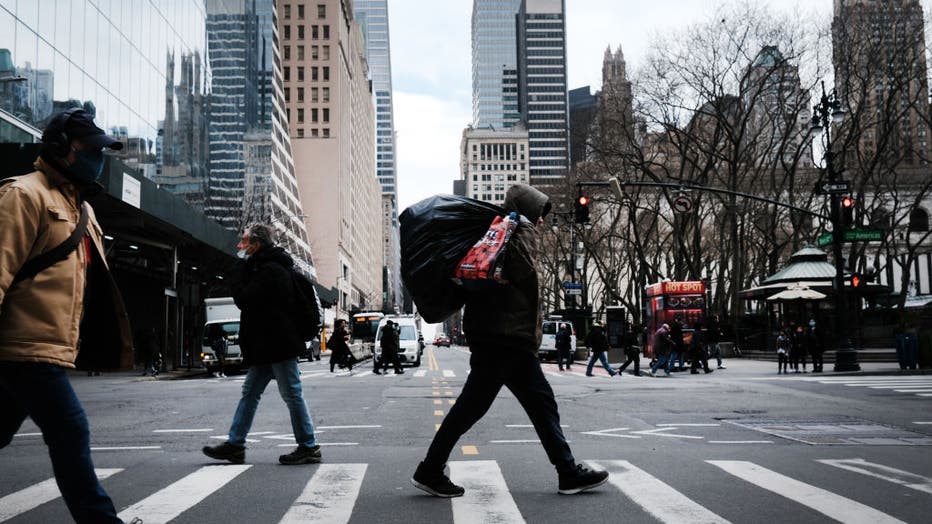Scientists say COVID-19 could become endemic but pose less of societal threat over time
Many scientists expect that the virus that causes COVID-19 will not be completely eradicated, but rather become endemic — meaning it will continue to circulate in pockets of the global population for years.
However, the virus could pose less of a threat to society over time in terms of deaths, illnesses and social isolation.
A survey of more than 100 immunologists, infectious-disease researchers and virologists in January by the scientific journal Nature found that most working in the field — almost 90% of respondents — said they expect SARS-CoV-2 to become endemic.
The term "endemic" refers to the "constant presence and/or usual prevalence of a disease or infectious agent in a population within a geographic area," according to the U.S. Centers for Disease Control and Prevention.
One example is malaria, the disease caused by a parasite and transmitted by mosquitos to humans, in parts of Africa, according to the CDC. Influenza is another example, along with the four other endemic types of coronaviruses that cause common colds.
But experts say these viruses don’t require lockdown measures, mask wearing and social distancing due to a combination of annual vaccines like the flu shot and acquired immunity — resulting in fewer seasonal deaths and illnesses by comparison.

FILE - People walk through the streets of Manhattan on March 1, 2021 in New York City. (Photo by Spencer Platt/Getty Images)
As Jennie Lavine, an infectious-disease researcher at Emory University, explains in the journal Nature, COVID-19 remains in a pandemic phase because the number of confirmed cases continues to increase worldwide and many people remain susceptible.
In the endemic phase, the number of COVID-19 infections would become relatively constant across multiple years with occasional flare-ups, Lavine said.
More than a third of the scientists surveyed by Nature thought it would be possible to eliminate SARS-CoV-2 from some regions of the globe, while it continued to circulate in others. Some said in regions with zero COVID-19 cases, there would be a continual risk of outbreaks — but if most people had been vaccinated, it could be quickly squashed by herd immunity.
"I guess COVID will be eliminated from some countries, but with a continuing (and maybe seasonal) risk of reintroduction from places where vaccine coverage and public-health measures have not been good enough," Christopher Dye, an epidemiologist at the University of Oxford, told the journal.
Scientists said the future will greatly depend on the type of immunity people receive through infection or vaccination, as well as how the virus evolves.
A study published last month in the journal Science found that immunity could potentially last for as long as 8 months after infection, but the length of immunity after developing COVID-19 or getting the vaccine remains unknown.
More than half the scientists surveyed by Nature think waning immunity will be one of the main drivers of the virus becoming endemic.
Jesse Bloom, an evolutionary biologist at the Fred Hutchinson Cancer Research Center in Seattle, told Nature that he thinks the coronavirus could follow a similar path as the seasonal flu in time, potentially falling into a pattern of annual outbreaks in the winter.
"I do think SARS-CoV-2 will become a less serious problem and something like flu," Bloom told the journal.
More than 514,000 Americans have died from COVID-19 since the onset of the outbreak, with over 28.6 million confirmed cases in the U.S., data from Johns Hopkins University shows. The global COVID-19 death toll stands at more than 2.5 million people.
For now, infectious disease experts have stressed that the pandemic phase isn’t going away any time soon.
Dr. Michael Ryan, director of the World Health Organization’s emergencies program, said at a media briefing Monday that it was "very premature" and "unrealistic" to think the COVID-19 pandemic might be completely stopped by the end of 2021.
Ryan noted that hospitalizations and deaths could be dramatically reduced by the end of the year with the recent arrival of effective vaccines. He said the world’s singular focus right now should be to keep the transmission of COVID-19 as low as possible and to get as many people vaccinated as quickly as possible.
This story was reported from Cincinnati.

